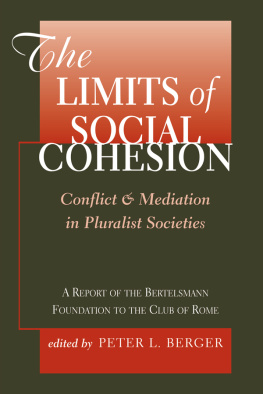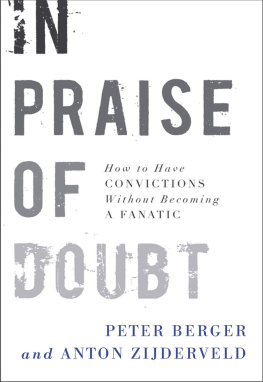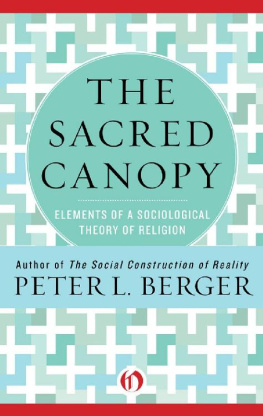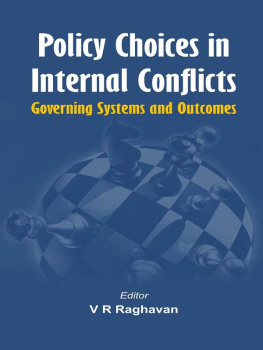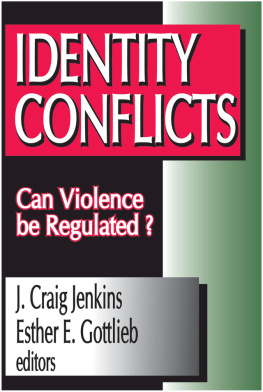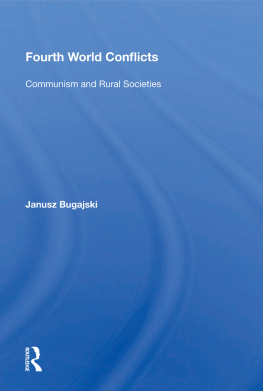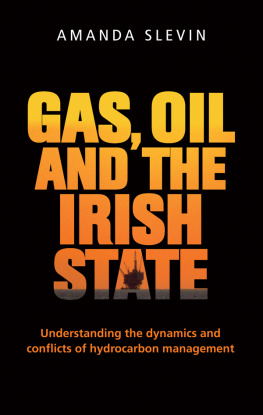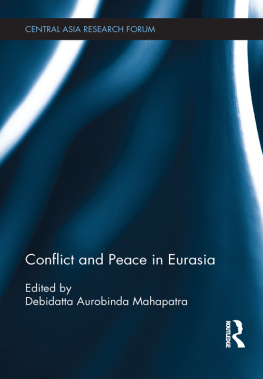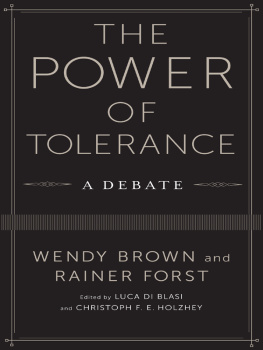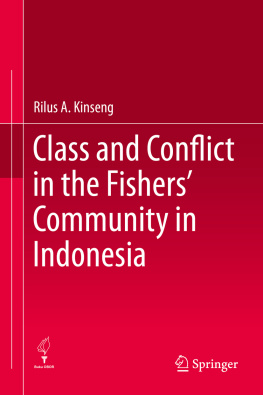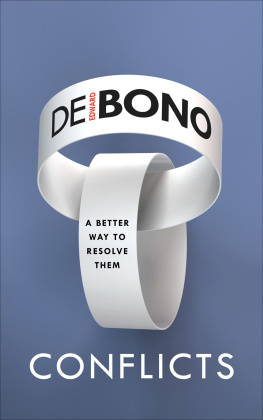Original title: Die Grenzen der Gemeinschaft: Konflikt und Vermittlung in pluralistischen Gesellschaften herausgegeben von Peter L. Berger
First published 1998 by Bertelsmann Foundation Publishers
Published 1998 by Westview Press
Published 2018 by Routledge
711 Third Avenue, New York, NY 10017, USA
2 Park Square, Milton Park, Abingdon, Oxon OX14 4RN
Routledge is an imprint of the Taylor & Francis Group, an informa business
Copyright 1998 by Bertelsmann Foundation Publishers
All rights reserved. No part of this book may be reprinted or reproduced or utilised in any form or by any electronic, mechanical, or other means, now known or hereafter invented, including photocopying and recording, or in any information storage or retrieval system, without permission in writing from the publishers.
Notice:
Product or corporate names may be trademarks or registered trademarks, and are used only for identification and explanation without intent to infringe.
Library of Congress Cataloging-in-Publication Data
The limits of social cohesion: conflict and mediation in pluralist
societies: a report of the Bertelsmann Foundation to the Club
of Rome/ edited by Peter L. Berger.
p. cm.
Includes bibliographical references and index.
ISBN 0-8133-3401-2 (cloth)
1. Social conflict. 2. Social norms. 3. Conflict management.
4. Mediation. I. Berger, Peter L.
HM136.L525 1998
303.6dc21
97-25243
CIP
ISBN 13: 978-0-8133-6719-4 (pbk)
by Werner Weidenfeld
Member of the Board of the Bertelsmann Foundation
This report is the result of years of close cooperation between the Club of Rome and the Bertelsmann Science Foundation. The President of the Club of Rome, Ricardo Dez-Hochleitner, and other distinguished members of the Club of Rome like Bertrand Schneider, Klaus von Dohnanyi, Eberhard von Koerber, and Ruud Lubbers are working in close connection with our foundation. In the context of this dialogue we developed the idea that the Club of Rome should work on the basic issue of social cohesion in our societies as the crucial challenge on a future-oriented agenda.
Future historians looking back on our epoch will define our time as one of the periods with the most profound changes ever experienced in our history. As contemporaries of such times of change, we remain focused essentially on the surface of the spectacular current events, frequently failing to notice the shifts behind the scenes and in the deep dimensions of attitudes, values, and mentalities, and failing to come to terms with the tectonic changes of power and culture constellations.
Yet it is precisely these shifts that really deserve our attention. We are currently experiencing history in rapid motion:
- The Cold War has ended, and therefore the mental dividing lines of world politics, which provided patterns of explanation for international organizations and legitimation as well as for the internal cohesion of many societies, have disappeared.
- An ideology with a claim to universal dominance has vanished, and hence manifold distinctive enemy images and projections have lost their justification,
- Fixed political bloc formations and thus the segmentation of power have ended, and a variety of conflicts originating from numerous causes have emerged. Ethnic and nationalistic conflicts have resurfaced, and solutions must be sought, bringing with them new risks and dangers.
In those periods of dramatic changes with breathtaking opportunities for freedom, security, and wealth but also with explosive risks for the peaceful coexistence of peoples, fundamental questions of social and political life are again raised:
- How do we perceive our identity, both in individual and collective terms?
- How do pluralistic societies develop cultural and normative orientations?
- How can normative conflicts be solved in an acceptable, constructive way?
- What holds a society together?
All of these questions must be considered in the light of an extensive international interdependence in the economic, political, and cultural spheres.
In the new world political era, the cultural resources that lead to social cohesion and the limits of that cohesion in our societies are of the utmost importance. It will be the primary task for societies to promote social cohesion as the basic source of economic development and ecological sensibility. The cultural foundations of society deserve our full attention as a basis of sustainable development.
In the past the debate about the limits to growth created a certain understanding, namely, that economic activities consume the resources on which the existence of mankind is dependent. The discussions caused remarkable changes in our thinking and led to the conviction that we should not consume the very basis that our economic and human survival depends on. This is the contribution of the Club of Rome to recent history, having created an awareness and having fostered discussion irrespective of the scientific exactness of the developed scenarios.
A comparative effort now lies ahead for our societies to make clear that there are not only limits to growth but also limits to the social cohesion on which our survival as human beings in peaceful societal circumstances depends. This report is intended to deliver the message to the Club of Rome and the general public that we all have to be very sensitive and very careful in dealing with the cultural resources of our societies, with norms, values, and social attitudes.
Sensitivity and care should be directed in particular toward generating a tolerant dialogue on norms and values within and between societies. Our interest should focus on mediating structures that allow societies to cope with conflict. Mediation is required to allow varied normative positions to coexist and different value systems to be maintained without inimical consequences to equally legitimate and respect-deserving positions of others. This very subject deserves our full attention and requires major efforts in the near future to develop paths that can be distinguished and widened to become roads to peace and mutual understanding.
This report was developed over the last few years by an international team of fourteen outstanding researchers representing many cultures of the world under the chairmanship of Professor Peter L. Berger from Boston University Dirk Rumberg and Volker Then from the Bertelsmann Foundation assisted in coordinating the project team and making this joint effort possible. With its extensive project on normative conflicts, the Bertelsmann Science Foundation laid down the basis for this report. The research team analyzed eleven countries, raising the central question of how societies can solve normative conflicts and therefore maintain social cohesion. The report assesses the question of social cohesion from a comparative perspective, taking into account questions of international and intercultural comparison. The countries included are Chile, France, Germany, Hungary, India, Indonesia, Japan, South Africa, Taiwan, Turkey, and the United States.

